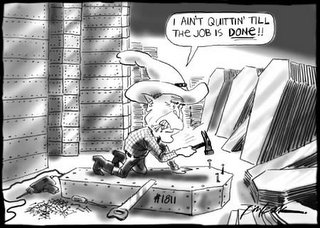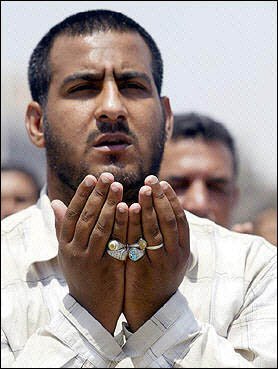 |
Saturday, December 24, 2005
GOD WATCH OVER THE PEOPLE OF IRAQ, THE SONS AND DAUGHTERS OF AMERICA AND THE COALITION, PLEASE KEEP THEM SAFE THIS DAY.
Rumsfeld Tells Troops They'll Win Iraq War
Those that will not be protecting their Country, ever.


Defense Secretary Donald H. Rumsfeld, serving Christmas Eve dinner to U.S. soldiers, told the troops they will persevere and win the war in Iraq, just as generations of Americans prevailed in past conflicts. Rumsfeld told the troops the war that has cost more than 2,150 U.S. lives was a ''test of wills.'' But he added that previous generations of U.S. soldiers faced similar tests and won. Over the roar of helicopters, the secretary said most Iraqis supported the fight for democracy.
''In this fight, the vast majority of Iraqis stand on the side of freedom,'' he said. As U.S. military forces begin to scale back in Iraq, their growing focus on training over combat could lead to a decline in casualties just as the American political season begins to heat up. Rumsfeld's war zone announcement canceling the deployment to Iraq of two brigades is just the beginning of a gradual drawdown of U.S. forces, according to military commanders.
Rumsfeld, who spent the night at the Camp Victory military installation in Baghdad, had breakfast Saturday with a group of American military intelligence collectors and analysts. Rumsfeld has been trying to encourage efforts to tie the U.S. intelligence effort more closely to military and police operations. That meeting was closed to reporters. Before flying from Baghdad to Balad, north of the Iraqi capital, Rumsfeld was given a classified briefing on the military's efforts to minimize the danger to troops from roadside bombs, which the military calls improvised explosive devices, or IEDs. He also saw a display of IED detection and destruction devices, as well as vehicles with modifications designed to protect soldiers from the explosions.
Link Here


Defense Secretary Donald H. Rumsfeld, serving Christmas Eve dinner to U.S. soldiers, told the troops they will persevere and win the war in Iraq, just as generations of Americans prevailed in past conflicts. Rumsfeld told the troops the war that has cost more than 2,150 U.S. lives was a ''test of wills.'' But he added that previous generations of U.S. soldiers faced similar tests and won. Over the roar of helicopters, the secretary said most Iraqis supported the fight for democracy.
''In this fight, the vast majority of Iraqis stand on the side of freedom,'' he said. As U.S. military forces begin to scale back in Iraq, their growing focus on training over combat could lead to a decline in casualties just as the American political season begins to heat up. Rumsfeld's war zone announcement canceling the deployment to Iraq of two brigades is just the beginning of a gradual drawdown of U.S. forces, according to military commanders.
Rumsfeld, who spent the night at the Camp Victory military installation in Baghdad, had breakfast Saturday with a group of American military intelligence collectors and analysts. Rumsfeld has been trying to encourage efforts to tie the U.S. intelligence effort more closely to military and police operations. That meeting was closed to reporters. Before flying from Baghdad to Balad, north of the Iraqi capital, Rumsfeld was given a classified briefing on the military's efforts to minimize the danger to troops from roadside bombs, which the military calls improvised explosive devices, or IEDs. He also saw a display of IED detection and destruction devices, as well as vehicles with modifications designed to protect soldiers from the explosions.
Link Here
Former Jeff Gannon publisher running for Vice Chair of Texas GOP
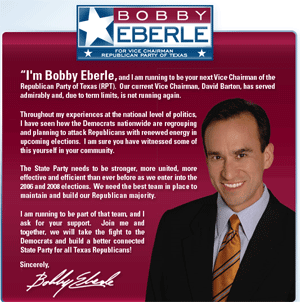
Gannon's ex-boss runs for TX GOP VP
GOP USA's Eberle hired escort to cover WH, now runs for party Vice Chair.
Quotes Of The Year...
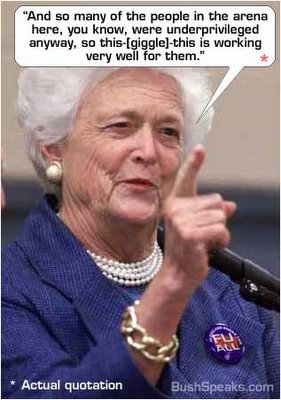
Newsweek December 24, 2005 at 12:47 PM
READ MORE: 2006, George W. Bush, Hurricane
Dec. 26, 2005 - Jan 2, 2006 issue - "What I'm hearing, which is sort of scary, is they all want to stay in Texas. Everyone is so overwhelmed by the hospitality. And so many of the people in the arena here, you know, were underprivileged anyway, so this is working very well for them."
Former First Lady Barbara Bush, on hurricane refugees in the Houston Astrodome. The White House qualified the controversial remarks as a "personal observation."
READ WHOLE STORY
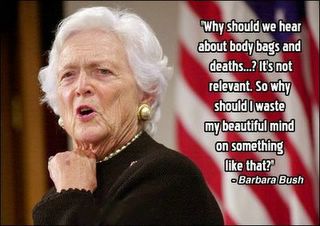
AN EVEN MORE SADISTIC QUOTE
Like Mother Like Son
Send them both, mother and son to Iraq on patrol in his Humvees
Bush Grants 11 Pardons...

Associated Press December 24, 2005 at 10:04 AM
READ MORE: George W. Bush
President Bush has granted 11 pardons, bringing to 69 the number of clemency orders he has issued since taking office five years ago, the Justice Department said.
Three moonshiners and a bank robber are among those pardoned, as is a Denver lawyer with Republican political ties. The pardons were issued yesterday, in keeping with a tradition of granting clemency during the holidays.
READ WHOLE STORY
Novak Says He Had Better Sources Than Bush On Iraqi WMD…

Think Progress December 24, 2005 at 01:24 AM
READ MORE: George W. Bush, Saddam Hussein, CIA, Iraq
From thinkprogress.org
BLITZER: What was so bad about going in and getting rid of Saddam Hussein?
NOVAK: It was wonderful getting rid of him. I'd like to get rid of a lot of dictators, but we can't send the U.S. military around the world to get rid of every dictator.
The question was, was it necessary in the national interest?
BLITZER: Was it?
NOVAK: I didn't think it was. I didn't think it at the time. Because I said several times on this network that there were no weapons of mass destruction in Iraq.
BLITZER: How did you know that and the president of the United States, the vice president of the United States were convinced that there were apparently?
NOVAK: Because my sources -- I don't run my own CIA. My sources didn't think there were, in the military, people I trusted.
And the indication by the inspectors indicated there was no weapons. But the point...
Read the transcript here.
READ WHOLE STORY
It Is Worse Than Anyone Thought. It figures..
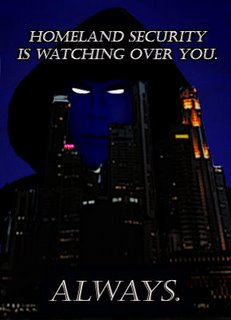
Spy Agency Mined Vast Data Trove, Officials Report
By ERIC LICHTBLAU and JAMES RISEN
Published: December 24, 2005
Link Here
WASHINGTON, Dec. 23 - The National Security Agency has traced and analyzed large volumes of telephone and Internet communications flowing into and out of the United States as part of the eavesdropping program that President Bush approved after the Sept. 11, 2001, attacks to hunt for evidence of terrorist activity, according to current and former government officials.
The volume of information harvested from telecommunication data and voice networks, without court-approved warrants, is much larger than the White House has acknowledged, the officials said. It was collected by tapping directly into some of the American telecommunication system's main arteries, they said.
As part of the program approved by President Bush for domestic surveillance without warrants, the N.S.A. has gained the cooperation of American telecommunications companies to obtain backdoor access to streams of domestic and international communications, the officials said.
The government's collection and analysis of phone and Internet traffic have raised questions among some law enforcement and judicial officials familiar with the program. One issue of concern to the Foreign Intelligence Surveillance Court, which has reviewed some separate warrant applications growing out of the N.S.A.'s surveillance program, is whether the court has legal authority over calls outside the United States that happen to pass through American-based telephonic "switches," according to officials familiar with the matter.
"There was a lot of discussion about the switches" in conversations with the court, a Justice Department official said, referring to the gateways through which much of the communications traffic flows. "You're talking about access to such a vast amount of communications, and the question was, How do you minimize something that's on a switch that's carrying such large volumes of traffic? The court was very, very concerned about that."
Since the disclosure last week of the N.S.A.'s domestic surveillance program, President Bush and his senior aides have stressed that his executive order allowing eavesdropping without warrants was limited to the monitoring of international phone and e-mail communications involving people with known links to Al Qaeda.
What has not been publicly acknowledged is that N.S.A. technicians, besides actually eavesdropping on specific conversations, have combed through large volumes of phone and Internet traffic in search of patterns that might point to terrorism suspects. Some officials describe the program as a large data-mining operation.
The current and former government officials who discussed the program were granted anonymity because it remains classified.
Bush administration officials declined to comment on Friday on the technical aspects of the operation and the N.S.A.'s use of broad searches to look for clues on terrorists. Because the program is highly classified, many details of how the N.S.A. is conducting it remain unknown, and members of Congress who have pressed for a full Congressional inquiry say they are eager to learn more about the program's operational details, as well as its legality.
Officials in the government and the telecommunications industry who have knowledge of parts of the program say the N.S.A. has sought to analyze communications patterns to glean clues from details like who is calling whom, how long a phone call lasts and what time of day it is made, and the origins and destinations of phone calls and e-mail messages. Calls to and from Afghanistan, for instance, are known to have been of particular interest to the N.S.A. since the Sept. 11 attacks, the officials said.
This so-called "pattern analysis" on calls within the United States would, in many circumstances, require a court warrant if the government wanted to trace who calls whom.
The use of similar data-mining operations by the Bush administration in other contexts has raised strong objections, most notably in connection with the Total Information Awareness system, developed by the Pentagon for tracking terror suspects, and the Department of Homeland Security's Capps program for screening airline passengers. Both programs were ultimately scrapped after public outcries over possible threats to privacy and civil liberties.
But the Bush administration regards the N.S.A.'s ability to trace and analyze large volumes of data as critical to its expanded mission to detect terrorist plots before they can be carried out, officials familiar with the program say. Administration officials maintain that the system set up by Congress in 1978 under the Foreign Intelligence Surveillance Act does not give them the speed and flexibility to respond fully to terrorist threats at home.
A former technology manager at a major telecommunications company said that since the Sept. 11 attacks, the leading companies in the industry have been storing information on calling patterns and giving it to the federal government to aid in tracking possible terrorists.
"All that data is mined with the cooperation of the government and shared with them, and since 9/11, there's been much more active involvement in that area," said the former manager, a telecommunications expert who did not want his name or that of his former company used because of concern about revealing trade secrets.
Such information often proves just as valuable to the government as eavesdropping on the calls themselves, the former manager said.
"If they get content, that's useful to them too, but the real plum is going to be the transaction data and the traffic analysis," he said. "Massive amounts of traffic analysis information - who is calling whom, who is in Osama Bin Laden's circle of family and friends - is used to identify lines of communication that are then given closer scrutiny."
Several officials said that after President Bush's order authorizing the N.S.A. program, senior government officials arranged with officials of some of the nation's largest telecommunications companies to gain access to switches that act as gateways at the borders between the United States' communications networks and international networks. The identities of the corporations involved could not be determined.
The switches are some of the main arteries for moving voice and some Internet traffic into and out of the United States, and, with the globalization of the telecommunications industry in recent years, many international-to-international calls are also routed through such American switches.
One outside expert on communications privacy who previously worked at the N.S.A. said that to exploit its technological capabilities, the American government had in the last few years been quietly encouraging the telecommunications industry to increase the amount of international traffic that is routed through American-based switches.
The growth of that transit traffic had become a major issue for the intelligence community, officials say, because it had not been fully addressed by 1970's-era laws and regulations governing the N.S.A. Now that foreign calls were being routed through switches on American soil, some judges and law enforcement officials regarded eavesdropping on those calls as a possible violation of those decades-old restrictions, including the Foreign Intelligence Surveillance Act, which requires court-approved warrants for domestic surveillance.
Historically, the American intelligence community has had close relationships with many communications and computer firms and related technical industries. But the N.S.A.'s backdoor access to major telecommunications switches on American soil with the cooperation of major corporations represents a significant expansion of the agency's operational capability, according to current and former government officials.
Phil Karn, a computer engineer and technology expert at a major West Coast telecommunications company, said access to such switches would be significant. "If the government is gaining access to the switches like this, what you're really talking about is the capability of an enormous vacuum operation to sweep up data," he said.
Friday, December 23, 2005
'The reason the Bush administration didn't want to go after bin-Laden was two-fold. First, ..'
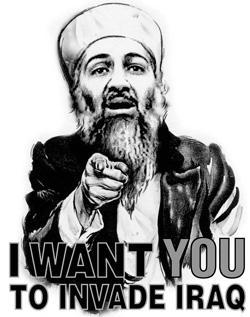
The Emperor President:
What's really behind Bush's domestic spy program and why their excuses will keep changing
by August Keso, December 23rd, 2005
Link Here
They will windmill their defenses hoping -- desperately -- that one rationalization or another will connect - stick, because if it doesn't...their dream of the "Emperor President"; omnipotent, freedom and liberty granting or refusing, all powerful Presidency will end with Bush's deserved impeachment.
Who could possibly keep up with the ever shifting, morphing, changing excuses the Bush administration has given for their illegal and un-Constitutional domestic spying program? They remind a person of the kid whom, when in a fight, would swing their arms in an overhead windmill fashion, desperately hoping against hope that one of the blows would connect...land...stick. Whenever one of the Bush administrations wholly fabricated legal "justifications" or -- lets just call it what it is, they got caught pulling a Nixon and now, are desperately trying to wiggle out of it -- lies are exposed, as the lie it is - they just make up a new one.
"But Moschella argued yesterday that espionage is 'a fundamental incident to the use of military force' and that its absence from the resolution 'cannot be read to exclude this long-recognized and essential authority to conduct communications intelligence targeted at the enemy.' Such eavesdropping, he wrote, necessarily included conversations in which one party is in the United States."
Imagine that! Spying on American citizens has suddenly become a fundamental part of Bush's unbridled powers. Right, because this administration can truly be trusted. Not like they've ever mislead the American people. If they say the program is only monitoring supposed "terrah" related conversations it must be true - right? If they say the program is only monitoring "international" conversations "in which only one party is in the United States," it must be true - right? Bush wouldn't mislead the American people - right? His administration wouldn't be using this newly fabricated power to monitor Republican political opponents, or Quakers, or Catholics - right?
"Literally minutes before the Senate cast its vote, the administration sought to add the words 'in the United States and' after 'appropriate force' in the agreed-upon text...This last-minute change would have given the president broad authority to exercise expansive powers not just overseas -- where we all understood he wanted authority to act -- but right here in the United States, potentially against American citizens. I could see no justification for Congress to accede to this extraordinary request for additional authority. I refused," Daschle wrote in an op-ed piece for the Washington Post.
Daschle was the Senate Majority Leader at the time of the Congressional resolution authorizing -- and defining -- powers granted to Bush. That the Bush administration sought to add language specific to their actions within the United States, shows - proves - they knew beforehand, that the Congressional resolution did not -- repeat, did not -- give them authority to operate within the United States.
Camouflaged, however poorly, beneath the rubble of excuses for Bush spying on you, me, and the American people is the real reason this administration has taken to shredding the constitution.
"Safeguarding the security of the United States outweighs individuals' rights to privacy, the Bush administration asserted on Friday in a letter to Congress defending a top-secret operation that has been eavesdropping on Americans without court authorization."
There is a hint. Not the full story, but a pretty obvious hint. One that seems fairly benign at first glance, but it isn't at all. It is heinous! Bush now, according to them, has the sole power -- a power Daschle said didn't exist in the Congressional resolution -- to discard civil liberties under the ruse of safeguarding the security of the country. But what is the real reason:
"The vice president entered the fray Tuesday, rejecting the criticism and expounding on the philosophy that has driven so many of the administration's actions. 'I believe in a strong, robust executive authority, and I think that the world we live in demands it...' Cheney said. In wartime, he said, the president 'needs to have his constitutional powers unimpaired.'"
Again, upon first blush, seems rather harmless, but again, it isn't - it is insidious. This administration has spent practically everyday since 911 trying to convince the American people that this is a "different world" it is a "post-911" world. A world where all the old ways of viewing things -- including our Constitution, freedoms, and liberties -- have changed...have to change. To drive the point home -- until Howard Dean finally said publicly what many had been wondering -- the administration presented a near daily barrage of new terror threats. Over and again, beating fear into the American people. "Be afraid...be very afraid," their silly terror threats were meant to convey. Be fearful enough to surrender your freedom.
Coupled to the notion of a "post-911" world was what? The stated idea of a terror war being a nearly never-ending struggle! This so-called war, this "new kind of war" won't take merely years, but decades...nay, generations.
That was it - there message. It's a post-911 world, and we'll be at this for a generation or two or three or... .
Well, if this is going to be such a long hard struggle why didn't they get after bin-Laden? Why, when they had bin-Laden dead-to-rights at Tora Bora, did they let him slip away?
"Bush asserted that U.S. commanders on the ground did not know if bin Laden was at the mountain hideaway along the Afghan border.
"But in a forthcoming book, the CIA field commander for the agency's Jawbreaker team at Tora Bora, Gary Berntsen, says he and other U.S. commanders did know that bin Laden was among the hundreds of fleeing Qaeda and Taliban members. Berntsen says he had definitive intelligence that bin Laden was holed up at Tora Bora -- intelligence operatives had tracked him -- and could have been caught. 'He was there.'"
The reason the Bush administration didn't want to go after bin-Laden was two-fold. First, it would have made it more difficult for them to then, invade Iraq. The "terrah" king-pin is captured, why go into Iraq? People would have been much less willing. Secondly, and more importantly, the capture of bin-Laden -- in the mind of many Americans -- might have looked too much like victory.
How can Bush and Cheney have a "generational" war, if the opponent's leader is so easily captured? The answer: there can't be a generational war. Politically, people in the United States would have relaxed.
Geez...there hadn't been enough time to fully indoctrinate the American public into the "post-911" world-view.
The scary world-view where danger lurks round every corner, and the only way to protect the people from that "danger" is to give Big Brother the right to pick-n-choose, which freedoms and liberties you -- the American people -- get to enjoy. If bin-Laden were captured too soon, or at all, there would be no chance -- no excuse -- to establish a new American perspective on their liberties, or as Cheney himself so brazenly put it, "in wartime the president 'needs to have his constitutional powers unimpaired.'"
Were bin-Laden so easily captured, and people believed the threat lessened, or at the very least, the struggle against terrorism not difficult as led to believe, the administration and their Neo-Conservative goal of establishing the Emperor President couldn't be fulfilled. Ultimately, that is what the domestic spying and the entire war on "terrah" is about. Shifting the power from that of three co-equal branches of government, to a paradigm in which the President wields all meaningful power.
The war on "terrah" is now, and has been since 911, one part reality based and another very much pure fiction. The war on "terrah" is, for Bush-Cheney and Neo-Conservatives, a convenient method to be the means of obtaining their madness.
Bush-Cheney and the Neo-Conservatives quickly recognized establishing the "Emperor-President" couldn't happen without an underlying force driving the American people away from their long-held civil liberties. They -- their words, as found in the Project for a New American Century -- needed a "new Pearl-Harbor." They knew too, eroding the freedoms and liberties outlined in the Constitution -- in a headlong assault -- wouldn't be possible. But, if there were to exist a war, a war lasting decades -- a generational war -- and during this so-called war, the President were to establish his unchallengeable right to willy-nilly pick-n-choose, which freedoms and liberties the people were allowed to have...why, over decades and generations - people would simply forget they ever had any rights, not granted by the Emperor-President, at all.
This administration's excuses -- lies -- for why they are spying on you, me, and all the American people, will continue to shift and change. They will windmill their defenses hoping -- desperately -- that one rationalization or another will connect - stick, because if it doesn't...their dream of the "Emperor President"; omnipotent, freedom and liberty granting or refusing, all powerful Presidency will end with Bush's deserved impeachment.
Ummm.... Any Questions...???

Iraq's election result: a divided nation
By Patrick Cockburn
Link Here
Iraq is disintegrating. The first results from the parliamentary election last week show the country is dividing between Shia, Sunni and Kurdish regions.
Religious fundamentalists now have the upper hand. The secular and nationalist candidate backed by the US and Britain was humiliatingly defeated.
Now..WHY is the ACTING head of the C.I.A. telling the Turks to get ready to help us bomb IRAN AND SYRIA...??
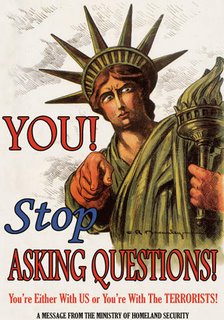
CIA’s Goss Reportedly
Warned Ankara Of
Iranian Threat
Link Here
Cumhuriyet - During his recent visit to Ankara, CIA Director Porter Goss reportedly brought three dossiers on Iran to Ankara.
Goss is said to have asked for Turkey’s support for Washington’s policy against Iran’s nuclear activities, charging that Tehran had supported terrorism and taken part in activities against Turkey.
Goss also asked Ankara to be ready for a possible US air operation against Iran and Syria.
Goss, who came to Ankara just after FBI Director Robert Mueller’s visit, brought up Iran’s alleged attempts to develop nuclear weapons. It was said that Goss first told Ankara that Iran has nuclear weapons and this situation was creating a huge threat for both Turkey and other states in the region. Diplomatic sources say that Washington wants Turkey to coordinate with its Iran policies. The second dossier is about Iran’s stance on terrorism. The CIA argued that Iran was supporting terrorism, the PKK and al-Qaeda. The third had to do with Iran’s alleged stance against Ankara. Goss said that Tehran sees Turkey as an enemy and would try to “export its regime.”
"It is frankly self-interest, self-preservation."

Newly Emboldened Congress Has Dogged Bush This Year
By Jim VandeHei and Charles Babington
Washington Post
After four years in which Congress repeatedly lay down while President Bush dictated his priorities, 2005 will go down as the year legislators stood up.
This week's uprising against a four-year extension of the USA Patriot Act was the latest example of a new willingness by lawmakers in both parties to challenge Bush and his notions of expansive executive power.
Since this spring, Congress has forced Bush to scrap plans for a broad restructuring of Social Security, accept tighter restrictions on the treatment of detainees and rewrite his immigration plan. Lawmakers have rebuffed Bush's call to make permanent his first-term tax cuts and helped force the president to speak more candidly about setbacks in Iraq.
"What you have seen is a Congress, which has been AWOL through intimidation or lack of unity, get off the sidelines and jump in with both feet," especially on the national security front, said Sen. Lindsey O. Graham (R-S.C.).
What is most striking is that the pushback is coming not just from Democrats and moderate Republicans, who often disagree with Bush, but also from mainstream conservatives.
The year's events, say some legislators and scholars, reflect more than just a change in the president's legislative scorecard. They suggest Bush may have reached the outer limits of a long-term project to reshape the powers of the presidency. This effort was underway even before the military intervention in Iraq and the Sept. 11, 2001, terrorist attacks contributed to a traditional wartime flow of authority to the executive branch.
Since the Sept. 11 attacks, Bush has been especially aggressive in the area of domestic surveillance. This month's revelations about the administration's use of the highly secret National Security Agency to monitor some domestic communications without judicial review has whetted a new -- and critics say overdue -- appetite for congressional oversight. Hearings are planned next month into whether Bush acted lawfully.
Power among three branches of government always ebbs and flows, and it is possible Bush will regain dominance.
But several factors are working against him as he heads into the final three years of his presidency without obvious momentum. Many of the priorities he laid out at the start of the year, such as revamping Social Security, went nowhere. Bush has yet to highlight a new agenda, though White House aides say he will do that in the new year.
Bush's task, however, is complicated by the fraying of reins that he and GOP congressional leaders jointly used to keep control of Washington's agenda. A leadership crisis in the House -- prompted by the indictment of former majority leader Tom DeLay (R-Tex.) on charges of campaign finance violations -- has made it harder to enforce loyalty from rank-and-file Republicans. In the unwieldy Senate, meanwhile, party discipline remains difficult even though Republicans hold 55 of the 100 seats -- as was proved this week when the leadership had to yield on an Alaska oil-drilling proposal and the Patriot Act extension.
As important, Bush cannot run again, and the closer lawmakers get to the next congressional elections, the more inclined they are to oppose him if it helps them at home. Rep. J.D. Hayworth (R-Ariz.), for instance, told constituents he would not want the president campaigning for him because he feels Bush's immigration policy is too soft on border enforcement.
"This is partly a function of approval ratings," said Sen. John Thune (R-S.D.). "People pay attention [to polls] and start saying, 'Lets take a more independent tack.' It is frankly self-interest, self-preservation."
Bush also faces a Democratic Party more united in its opposition than perhaps at any point this decade. Emboldened by their defeat of Bush Social Security's plan, Democrats have shown unusual solidarity in thwarting his agenda elsewhere. They have also instituted a leadership system to discourage dissent by threatening members with the loss of committee seats if they work too closely with the GOP. Roll Call newspaper recently reported that House Minority Leader Nancy Pelosi (D-Calif.) threatened to remove Rep. Edolphus Towns (D-N.Y.) from the Energy and Commerce Committee for siding with Republicans on a key trade bill. Towns did not return five phone calls requesting comment.
Nowhere has this changing attitude -- and the influence of Congress -- been more apparent than in the debate over Iraq and terrorism-fighting tactics in recent months. Led by Sen. John McCain (R-Ariz.), Congress forced the president to accept specified limits on torture that Vice President Cheney and Bush opposed for months. That victory came only weeks after Congress put pressure on Bush to more clearly articulate his Iraq strategy, which led to a new White House campaign in recent weeks to restate the case for the war to the public.
Now, some in Congress are trying to take back some of the authority they granted the Bush White House last term. When four Senate Republicans joined nearly all the Democrats in filibustering a four-year renewal of the domestic surveillance law called the Patriot Act -- which Bush ardently sought -- his Senate allies were forced to accept a temporary six-month extension. Yesterday, the House dealt a tougher blow to the president, agreeing only to a one-month extension. Bush had repeatedly said he would not accept "a short-term extension," but the GOP-controlled House left him no choice.
As for the non-security matters, which got much less attention this year, Congress is also showing more vigor in driving the agenda. In the immigration debate, Republican congressional anxieties forced Bush to talk more about border security.
"I think the congressional agenda has been more realistic and frankly more limited than Bush's," said Rep. Tom Cole (R-Okla.). "The Bush presidency has a lot of big ideas, which is generally a good thing, but there just is not a lot of legislative follow-through."
Cole echoed what is one of the biggest GOP gripes about the Bush White House: that it lacks seasoned political and policy aides with the experience to work with congressional leaders. But several lawmakers said that after that message was delivered privately to Bush, they have seen the White House pay more attention to congressional concerns.
' And, yes, we’ve tortured people.'
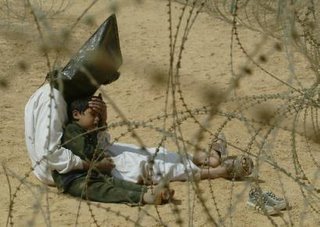
God Rest Ye Merry Torturers
By W. David Jenkins III
Link here
The snow finally arrived in my little conservative pot-hole in upstate New York . As much as I detest winter and the cold, there’s something incomparably peaceful about a late December night as the snow falls. The quiet is so intense that you can almost hear the flakes touch the ground. The only thing breaking the silence is the sound of the chains of a lone snow plow in the distance or, if the hour is early enough, the bells of one of three churches in my neighborhood chiming a Christmas carol. It’s kind of Norman Rockwell when you get right down to it. But there’s a problem.
Right now, on this very night while I take in the quiet warmth and comforting seclusion with my family this holiday season, somewhere out there is a man far from his loved ones. He wears a hood and his hands are bound behind his back. He lies bruised and naked in a dark, cold makeshift prison cell. The echoes of his screams still ring in his ears as immeasurable fear overtakes his very soul.
We don’t know who he is anymore than his family knows where he is. No one knows if he’s guilty of anything nor does anyone know if he’s just one of those “errors in policy” that Secretary of State Condi Rice referred so deprecatingly to during her recent trip to Europe . One thing we do know, however, is that the abuse of this man and others like him is being done in our name – with or without our approval.
Now I’m not so disillusioned to think that the history of this country is not tainted by actions and policies that would shock the average person. As lofty as the ideals of the founding fathers might have been, we cannot escape the fact that the genocide of the native people of this land centuries ago was perceived by some to be crucial to attaining those ideals. And that’s just the beginning. Our country’s history is rife with cruelty coupled with a sense of entitlement as we marched towards that American Dream.
We have plotted assassinations of leaders we disliked, we’ve dropped an uncountable tonnage of bombs, we’ve helped to overthrow governments and we have supported dictators, all in the name of democracy or preserving American values. And, yes, we’ve tortured people. From the “Stress and Duress” practices during the Kennedy administration to the teachings of the School of the Americas , a center for educating in the ways of torture, this country’s policy makers have relied on abusive and cruel tactics.
Even the Clinton administration cooperated with the abuse of a close friend of Ramzi Yousef by Philippine officials. Yousef was the mastermind behind the ’93 WTC bombing who was convicted in 1997. The information attained by one Abdul Hakim Murad was crucial to the successful prosecution of Yousef. We don’t know what happened to Murad although we can assume that it wasn’t pretty, but we do know that by selective use of questionable interrogation tactics, Ramzi Yousef is now serving a life sentence – unlike Osama bin Laden. I guess that’s the crux of the whole torture argument; one more thing that Bush has botched up at our expense and in our name.
Torture is now an indiscriminate industry under Bush. Rather than the secretive policy practiced by leaders of the past and administered as a last result upon people who were known to have certain intelligence, we have now adopted practices prone to gross error upon innocent individuals in a kind of deplorable reenactment of “Soylent Green.” In other words, we have the “bulldozers” out scooping up people all over the world based upon the fact that they might have intelligence that could be useful. The prudence of the use of extraordinary rendition is now a thing of the past – Bush has made it a reckless and blanket policy. Had people been paying attention years ago, they might have seen it coming.
Back in the spring of 2002, I remember a small text box in the NY Times reporting that Bush had withdrawn America ’s signature from the International Criminal Court on May 6. I remember thinking to myself that this was not a good sign of things to come. Why on earth would he do such a thing? After all, we had just been attacked about eight months before and had the cooperation and sympathies of practically the entire world. Why then would we thumb our nose to an international institution that might aid us in our mutual struggle?
Okay, okay – I was just kidding. I knew damn well what was up. It was a case of CYA (Cover Your A…..) because this administration knew damn well what policies they were going to implement. To his credit, Bush came right out in the days after 9/11 to the Rose Garden and told everyone that “we’re not going to tell you everything” and that is exactly the way they’ve proceeded – even after they get caught.
American leaders are now debating and defending torture during this season of “Peace on Earth, Good Will towards Men” – I mean it’s all so ghastly. And the most ironic aspect in all of this argument is that those who defend this abusive policy the loudest are the very same who are fired up over the alleged “war on Christmas.”
There is a photo that was published early on in the invasion. It showed a bound and hooded Iraqi sitting in the desert with his six year old son sitting on his lap. That image still haunts me to this day because, as the father of a six year old boy myself, the thought of what that man and that little boy must have been feeling at that time is simply too painful to think about. I want to know, what ever happened to them?
I want to know if that same dad became that naked and beaten figure in that cold wet cell somewhere far away from that little boy. I want to know how many more families have been affected by this not so secret and widespread cruelty that our leaders tell us is for our own good as well as our safety. I want to know how we as a country have become so paranoid and so lost that we would actually defend such behavior.
And while I cannot seem to get the image of that photo out of my mind, I also cannot seem to get the image of the boy president furiously ripping off the wrapping paper of his new X-Box 360 on Christmas morning.
God rest ye merry torturers.
--Man oh man.--
My Personal Opinion...? Congress should be pulled from their viper nest in D.C. And publicly FLOGGED.

Lawmakers: Congress Failed on Heating Funds
By ANDREW MIGA,
Associated Press Writer
Link Here
WASHINGTON - Millions of low-income families will face a bleak winter because Congress failed to deliver home-heating funds, Northeast lawmakers warned Thursday.
"It was the wrong choice for the American people in this cold holiday season," said Sen. Jack Reed (news, bio, voting record), D-R.I., who led a Senate fight for fuel assistance.
Home-heat advocates had been hopeful as late as Wednesday night that the Senate would approve two spending bills providing $4.1 billion in fuel assistance. But $2 billion in energy aid was stripped from a defense appropriations bill along with a GOP-backed provision to open Alaska's Arctic National Wildlife Refuge to oil drilling.
That left just $2.1 billion for this winter's Low Income Home Energy Assistance Program, slightly below last year's funding.
"It looked like Congress was going to do the right thing, but it never happened," said Mark Wolfe of the National Energy Assistance Directors' Association, which represents state agencies that distribute heat aid.
In a separate budget-cutting bill Wednesday, the Senate approved $1 billion to help families heat their homes next winter. That money is stalled in the House.
Continues if you can stomach it....
---You punks can give YOURSELF pay raises and start TRILLION DOLLAR WARS quick enough huh..??
Oh you bastards...
Heartless cruel murdering warmongering looting chickenhawk little bastards.---
God Damn You To Hell George W. Bush

Iraq: Game Over
Robert Dreyfuss
December 22, 2005
Link Here
The last hope for peace in Iraq was stomped to death this week. The victory of the Shiite religious coalition in the December 15 election hands power for the next four years to a fanatical band of fundamentalist Shiite parties backed by Iran, above all to the Supreme Council for the Islamic Revolution in Iraq (SCIRI). Quietly backed by His Malevolence, Ayatollah Ali al-Sistani, sustained by a 20,000-strong paramilitary force called the Badr Brigade, and with both overt and covert support from Iran's intelligence service and its Revolutionary Guard corps, SCIRI will create a theocratic bastion state in its southern Iraqi fiefdom and use its power in Baghdad to rule what's left of the Iraqi state by force.
The consequences of SCIRI's victory are manifold. But there is no silver lining, no chance for peace talks among Iraq's factions, no chance for international mediation. There is no centrist force that can bridge the factional or sectarian divides. Next stop: civil war.
There isn't any point in looking for silver linings in the catastrophic Iraqi vote. The likely next prime minister, Adel Abdel Mahdi, is a smooth-talking SCIRI thug. His boss, Abdel Aziz Hakim of SCIRI, is the former commander of the Badr Brigade and a militant cleric who has issued bloodthirsty calls for a no-holds-barred military solution to the insurgency. The scores of secret torture prisons by the SCIRI-led Iraqi ministry of the interior will proliferate, and SCIRI-led death squads will start going down their lists of targets. The divisive, sectarian constitution that was rammed down Iraq's throat in October by the Shiite religious bloc will be preserved intact under the new, "permanent government" of Iraq led by SCIRI.
The Kurds, ensconced in northern Iraq, will retreat further into their enclave, content to proceed step-by-step toward what they hope will be a breakaway rump state. Earlier this year, after the January 31 transitional elections, the Kurds made their deal with the Shiite devil, winning in exchange two vital (for them) points: that Iraq will have a virtually nonexistent central government will power reserved for the provincial regions, and that revenues from future Iraqi oil fields will go to those regions, not to the state. All the Kurds want now is to take over Kirkuk, which they will do with force, violence, and ethnic cleansing aimed at Arab residents of the Kirkuk area.
The Sunnis are already charging vote fraud, threatening to boycott or withdraw from the new assembly, and openly predicting that Iraq will now slide into civil war. There is virtually no combination of political alliances now that can guarantee Sunnis a fair share of power in the new Iraq. Every Sunni leader, from the most militant Baath Party activist to the most conservative Sunni clergyman, knows that a regime led by Hakim's SCIRI bloc will mean war. As a result, proponents of cooperating with the new government will become fence-sitters, and fence-sitters will join the resistance. The insurgency will continue, and possibly strengthen.
The more perceptive among U.S. intelligence officials and Iraq experts know how to read the situation, and they mostly believe it is hopeless. "I hate to say, 'Game over,'" says Wayne White, who led the State Department's intelligence effort on Iraq until last spring. "But we've lost it." There is no mechanism for the Sunnis now to restore a modicum of balance in Iraq, and the Shiite religious parties have no incentive to make significant concessions either to the Sunnis or to the resistance, White says.
Most worrying is the fact that centrist elements in Iraq—ranging from the CIA's favorite candidate, Iyad Allawi, to the Pentagon's chosen vehicle, Ahmed Chalabi—got blown away. Therefore, as I had hoped earlier (and wrote, in this space, two weeks ago, in a piece called "Iraq's Last Small Hope," and again, last week, in "Iraq's Tipping Point"), any chance that someone like Allawi could emerge as a power broker who could bridge the divide between religious Shiites and the Sunni-led resistance is gone. The planned-for Arab League peace conference, scheduled for late February or early March, likely won't happen. Violence will intensify.
For Bush, the results present an almost excruciatingly difficult problem. The White House will begin to look ridiculous as it touts Iraq's scandal-plagued, fraud-ridden election as the birth of democracy, especially as a brutal Shiite theocracy begins to take shape. The continuing resistance will make it impossible for the president to cite progress in the war. When President Bush starts to order a drawdown of U.S. forces in Iraq, as he must, he will not have the convenience of a peaceful, stable Iraq to point to. And the rise of Iran's power in Iraq presents another Rubik's Cube conundrum for the president. Some eager neocons, of course, will start to argue that the United States has no choice but to take the failed war in Iraq into Iran, to batter those who torment the U.S. occupation in Iraq. For others in the Bush administration, who at least live on planet earth, the problem of Iranian power in Iraq vastly complicates their ability to put a positive spin on the Bush administration's Iraq project.
The election disaster means that it is all the more important now for the United States to open direct, public talks with the Iraqi resistance, even if it means defying the Shiite religious-led regime. It is the United States whose 160,000 troops prop up the Shiites in power. Washington can no longer afford to give SCIRI and its junior partner, Al Dawa, veto power over its ability to negotiate a ceasefire with the opposition in order to pull out U.S. forces.
But it also means that every day that the U.S. forces remain in Iraq, the United States creates another day for the Shiite religious forces to strengthen their hand, to build their militia, and to make plans for cleansing Sunnis from majority Shiite areas. (It is, of course, with the help of the U.S. army that the Shiite militias are being incorporated into the new Iraqi army, unit by unit.) By getting out of Iraq as soon as possible, Jack Murtha-style, the United States can at the very least ensure that the Shiites do not grow all-powerful, and it might prevent a further radicalization of the Sunni-led resistance. When there are no good options, then prudence suggests that it's time to choose the least bad one.
---Fuck.---
Of the $230 Billion spent in invading and occuping Iraq:
$40 Million goes to Iraq and Afghanistan for civilian casualties :
The U.S. military uses these funds to run programs generally paying out up to $2,500 per victim to the families of those killed, and smaller amounts to those who are injured or have property destroyed or who were detained
Link Here
The U.S. military uses these funds to run programs generally paying out up to $2,500 per victim to the families of those killed, and smaller amounts to those who are injured or have property destroyed or who were detained
Link Here
Cheney Seeks 'Unimpaired' Presidential Powers
President Bush's decision to bypass court review and authorize domestic wiretapping by executive order was part of a concerted effort to rebuild presidential powers weakened in the 1970s as a result of the Watergate scandal and the Vietnam War, Vice President Dick Cheney said Tuesday.
Go to Original
Go to Original
Abramoff Discussing Plea Deal, May Testify against DeLay and Others
Mr. Abramoff is believed to have extensive knowledge of what prosecutors suspect is a wider pattern of corruption among lawmakers and Congressional staff members. One participant in the case who insisted on anonymity because of the sensitivity of the negotiations described him as a "unique resource."
Go to Original
Go to Original
ITAR-Tass news agency cites source as saying missing Azerbaijani passenger plane has crashed, The Associated Press reports
Amid Ruins, Volunteers Are Emerging as Heroes
By Anne Rochell Konigsmark and Rick Hampson
USA TODAY
Thursday 22 December 2005
In his 67 years, Howard Peterson had never seen a Mennonite. But 11 days before Christmas he stood in the ruins of his kitchen, watching a crew of them gut and clean his flood-ravaged house.
Peterson is a retired African-American barber who lives on disability payments. His eyes are sad, his movement listless, his voice weak. His helpers were strapping white men from Lancaster County, Pa., dressed in dark pants, collared shirts, suspenders and black straw hats.
Peterson and his wife couldn't afford to pay a contractor several thousand dollars to gut the one-story house, which sat in water for weeks after Hurricane Katrina inundated the working-class Gentilly district. So Peterson, who looks too frail to do spring cleaning, began trying to clear out the house himself. Then the Mennonites came by and offered a hand.
"I can't thank them enough," he says. But he also wonders when the professionals - city, state and federal agencies - will do their part. "They should be trying to repair the city."
The Gulf Coast in general and New Orleans in particular have at times felt abandoned by the American government. But they haven't been abandoned by Americans, who have volunteered by the thousands to clear out houses, collect trash, fight mold, cover roofs, feed the hungry, tend to the sick and help in any way they can. Now, as disaster relief gives way to rebuilding, volunteers are renovating and constructing homes, restocking libraries, surveying historic structures, tracking down voters and helping communities plan for the future.
Partly because politicians continue to dither, bicker and accuse, non-governmental organizations - "NGOs" ranging from large, non-profit agencies to church youth groups - are emerging as heroes of the recovery effort.
Habitat for Humanity, whose Operation Home Delivery has been building houses across the nation for shipment to the Gulf Coast, received an 85% "positive" rating for its post-hurricane work in a national Harris Poll released in November. FEMA, in contrast, got a 72% "negative" rating.
In New Orleans' devastated Lower 9th Ward, FEMA is so unpopular that its workers have been heckled and threatened. Some stopped wearing anything that identifies their agency.
Past crises generally have established the limits of non-government action; private charity proved insufficient to cope with the Great Depression, for example. This crisis seems to have a different lesson: Volunteers, outsiders and amateurs can help fill a void created by what Amy Liu, an urban policy expert at the Brookings Institution, calls "a lack of leadership across all levels of government."
"There's a general sense that the charitable sector has the touch needed, a better feel for the communities affected," says Paul Light, a New York University government analyst. >>>CONT
Go to Original
USA TODAY
Thursday 22 December 2005
In his 67 years, Howard Peterson had never seen a Mennonite. But 11 days before Christmas he stood in the ruins of his kitchen, watching a crew of them gut and clean his flood-ravaged house.
Peterson is a retired African-American barber who lives on disability payments. His eyes are sad, his movement listless, his voice weak. His helpers were strapping white men from Lancaster County, Pa., dressed in dark pants, collared shirts, suspenders and black straw hats.
Peterson and his wife couldn't afford to pay a contractor several thousand dollars to gut the one-story house, which sat in water for weeks after Hurricane Katrina inundated the working-class Gentilly district. So Peterson, who looks too frail to do spring cleaning, began trying to clear out the house himself. Then the Mennonites came by and offered a hand.
"I can't thank them enough," he says. But he also wonders when the professionals - city, state and federal agencies - will do their part. "They should be trying to repair the city."
The Gulf Coast in general and New Orleans in particular have at times felt abandoned by the American government. But they haven't been abandoned by Americans, who have volunteered by the thousands to clear out houses, collect trash, fight mold, cover roofs, feed the hungry, tend to the sick and help in any way they can. Now, as disaster relief gives way to rebuilding, volunteers are renovating and constructing homes, restocking libraries, surveying historic structures, tracking down voters and helping communities plan for the future.
Partly because politicians continue to dither, bicker and accuse, non-governmental organizations - "NGOs" ranging from large, non-profit agencies to church youth groups - are emerging as heroes of the recovery effort.
Habitat for Humanity, whose Operation Home Delivery has been building houses across the nation for shipment to the Gulf Coast, received an 85% "positive" rating for its post-hurricane work in a national Harris Poll released in November. FEMA, in contrast, got a 72% "negative" rating.
In New Orleans' devastated Lower 9th Ward, FEMA is so unpopular that its workers have been heckled and threatened. Some stopped wearing anything that identifies their agency.
Past crises generally have established the limits of non-government action; private charity proved insufficient to cope with the Great Depression, for example. This crisis seems to have a different lesson: Volunteers, outsiders and amateurs can help fill a void created by what Amy Liu, an urban policy expert at the Brookings Institution, calls "a lack of leadership across all levels of government."
"There's a general sense that the charitable sector has the touch needed, a better feel for the communities affected," says Paul Light, a New York University government analyst. >>>CONT
Go to Original
Daschle: Congress Denied Bush War Powers in US

By Barton Gellman
The Washington Post
Friday 23 December 2005
The Bush administration requested, and Congress rejected, war-making authority "in the United States" in negotiations over the joint resolution passed days after the terrorist attacks of Sept. 11, 2001, according to an opinion article by former Senate majority leader Thomas A. Daschle (D-S.D.) in today's Washington Post.
Daschle's disclosure challenges a central legal argument offered by the White House in defense of the National Security Agency's warrantless wiretapping of U.S. citizens and permanent residents. It suggests that Congress refused explicitly to grant authority that the Bush administration now asserts is implicit in the resolution.
The Justice Department acknowledged yesterday, in a letter to Congress, that the president's October 2001 eavesdropping order did not comply with "the 'procedures' of" the law that has regulated domestic espionage since 1978. The Foreign Intelligence Surveillance Act, or FISA, established a secret intelligence court and made it a criminal offense to conduct electronic surveillance without a warrant from that court, "except as authorized by statute."
There is one other statutory authority for wiretapping, which covers conventional criminal cases. That law describes itself, along with FISA, as "the exclusive means by which electronic surveillance . . . may be conducted."
Yesterday's letter, signed by Assistant Attorney General William Moschella, asserted that Congress implicitly created an exception to FISA's warrant requirement by authorizing President Bush to use military force in response to the destruction of the World Trade Center and a wing of the Pentagon. The congressional resolution of Sept. 18, 2001, formally titled "Authorization for the Use of Military Force," made no reference to surveillance or to the president's intelligence-gathering powers, and the Bush administration made no public claim of new authority until news accounts disclosed the secret NSA operation.
But Moschella argued yesterday that espionage is "a fundamental incident to the use of military force" and that its absence from the resolution "cannot be read to exclude this long-recognized and essential authority to conduct communications intelligence targeted at the enemy." Such eavesdropping, he wrote, necessarily included conversations in which one party is in the United States.
Daschle's article reveals an important new episode in the resolution's legislative history.
As drafted, and as finally passed, the resolution authorized the president "to use all necessary and appropriate force against those nations, organizations or persons" who "planned, authorized, committed or aided" the Sept. 11 attacks.
"Literally minutes before the Senate cast its vote, the administration sought to add the words 'in the United States and' after 'appropriate force' in the agreed-upon text," Daschle wrote. "This last-minute change would have given the president broad authority to exercise expansive powers not just overseas - where we all understood he wanted authority to act - but right here in the United States, potentially against American citizens. I could see no justification for Congress to accede to this extraordinary request for additional authority. I refused."
Daschle wrote that Congress also rejected draft language from the White House that would have authorized the use of force to "deter and pre-empt any future acts of terrorism or aggression against the United States," not only against those responsible for the Sept. 11 attacks.
Republican legislators involved in the negotiations could not be reached for comment last night.
Go to Original
Main Stream Media (MSM) should ask Americans about impeachment in their regular polls?
If you believe the Main Stream Media (MSM) should ask Americans about
impeachment in their regular polls, we encourage you to email the
pollsters by scrolling to the bottom of this page:
http://www.democrats.com/bush-impeachment-polls
Please use your own words in your emails, and be civil :)
Thanks for everything you do!
Bob Fertik, President
Democrats.com
bob@democrats.com
718-424-7772
impeachment in their regular polls, we encourage you to email the
pollsters by scrolling to the bottom of this page:
http://www.democrats.com/bush-impeachment-polls
Please use your own words in your emails, and be civil :)
Thanks for everything you do!
Bob Fertik, President
Democrats.com
bob@democrats.com
718-424-7772
VOTE FOR IMPEACHMENT TODAY
Please vote in this unscientific online survey at MSNBC (which has thus
far refused to do a real poll on the topic)
http://www.msnbc.msn.com/id/10562904/
Do you believe President Bush's actions justify impeachment?
* 71312 responses
Yes, between the secret spying, the deceptions leading to war and more,
there is plenty to justify putting him on trial.
87%
No, like any president, he has made a few missteps, but nothing
approaching "high crimes and misdemeanors."
4%
No, the man has done absolutely nothing wrong. Impeachment would just be a
political lynching.
8%
I don't know.
1%
far refused to do a real poll on the topic)
http://www.msnbc.msn.com/id/10562904/
Do you believe President Bush's actions justify impeachment?
* 71312 responses
Yes, between the secret spying, the deceptions leading to war and more,
there is plenty to justify putting him on trial.
87%
No, like any president, he has made a few missteps, but nothing
approaching "high crimes and misdemeanors."
4%
No, the man has done absolutely nothing wrong. Impeachment would just be a
political lynching.
8%
I don't know.
1%
Hey busheviks....

I triple dog DARE you to go read ThinkProgress.Org
They have dispelled EVERY SINGLE TALKING POINT and defense of bush imaginable....
Absolutely stunning. Absolutely damning.
They are on a roll over there. Go see, if you dare.
Hey Busheviks... Who is your daddy..??
A Saudi Lover.
Michelle Goldberg | Bush's Impeachable Offense

Yes, the president committed a federal crime by wiretapping Americans, say constitutional scholars, former intelligence officers and politicians. What's missing is the political will to impeach him.
Go to Original
Arlene Getz | Where's the Outrage?

By Arlene Getz
Newsweek
Wednesday 21 December 2005
Bush's defense of his phone-spying program has disturbing echoes of arguments once used by South Africa's apartheid regime. Why Americans should examine the parallels.
Back in the 1980s, when I was living in Johannesburg and reporting on apartheid South Africa, a white neighbor proffered a tasteless confession. She was "quite relieved," she told me, that new media restrictions prohibited our reporting on government repression. No matter that Pretoria was detaining tens of thousands of people without real evidence of wrongdoing. No matter that many of them, including children, were being tortured - sometimes to death. No matter that government hit squads were killing political opponents. No matter that police were shooting into crowds of black civilians protesting against their disenfranchisement. "It's so nice," confided my neighbor, "not to open the papers and read all that bad news."
I thought about that neighbor this week, as reports dribbled out about President George W. Bush's sanctioning of warrantless eavesdropping on American conversations. For anyone who has lived under an authoritarian regime, phone tapping - or at least the threat of it - is always a given. But US citizens have always been lucky enough to believe themselves protected from such government intrusion. So why have they reacted so insipidly to yet another post-9/11 erosion of US civil liberties?
I'm sure there are many well-meaning Americans who agree with their president's explanation that it's all a necessary evil (and that patriotic citizens will not be spied on unless they dial up Osama bin Laden). But the nasty echoes of apartheid South Africa should at least give them pause. While Bush uses the rhetoric of "evildoers" and the "global war on terror," Pretoria talked of "total onslaught." This was the catchphrase of P. W. Botha, South Africa's head of state from 1978 to 1989. Botha was hardly the first white South African leader to ride roughshod over civil liberties for all races, but he did it more effectively than many of his predecessors. Botha liked to tell South Africans that the country was under "total onslaught" from forces both within and without, and that this global assault was his rationale for allowing opponents to be jailed, beaten or killed. Likewise, the Bush administration has adopted the argument that anything is justified in the name of national security.
Botha was right about South Africa being under attack. Internally, blacks and a few whites were waging a low-level guerrilla war to topple the government. Externally, activists across the globe were mobilizing economic sanctions and campaigns to ostracize Pretoria. By the same token, we all know that Bush is right about the United States facing a very real threat of further terror. Yet should Americans really be willing to accept that autocratic end-justifies-the-means argument?
For so many around the world, the United States is as much a symbol as a nation. Outsiders may scoff at American naiveté in thinking that their conversations are private, but they envy them for growing up in a society so sheltered that it made such a belief possible. Among those who feel this way is Archbishop Desmond Tutu, the South African Anglican leader who won a Nobel Peace Prize for his principled fight for justice in his native country. "It's unbelievable," he told me in an interview, "that a country that many of us have looked to as the bastion of true freedom could now have eroded so many of the liberties we believed were upheld almost religiously."
Tutu recalled teaching in Jacksonville, Fla., when Bush won re-election in 2004. "I was shocked," he said, "because I had naively believed all these many years that Americans genuinely believed in freedom of speech. [But I] discovered there that when you made an utterance that was remotely contrary to what the White House was saying, then they attacked you. For a South African the déjà vu was frightening. They behaved exactly the same way that used to happen here - vilifying those who are putting forward a slightly different view." Tutu made these comments to me exactly a year ago next week. I haven't seen any reaction from him about the latest eavesdropping revelations, but I doubt he is remotely surprised at the US president's response: a defense of the tactic, together with a warning that the government would launch an investigation to find out who leaked the news to The New York Times.
It's not fair, of course, to suggest that all citizens are indifferent to violations of their privacy and their rights to free speech. Yet as I've watched this debate play out, it's hard to avoid the conclusion that not enough Americans really care. Like my Johannesburg neighbor, they seem to hope that unpleasant news will disappear if you just ignore it. It didn't then, and it won't now.
Go to Original
And Suddenly, The Choice of Alito Becomes Crystal Clear...
Dec. 23 (Bloomberg) -- Supreme Court nominee Samuel A. Alito wrote in a 1984 memo that U.S. attorneys general should be immune from being sued on claims of ordering illegal wiretaps.
Link Here
Link Here
Iraq Sunni, Shiite Groups Threaten Boycott of Government
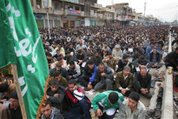
By Patrick Quinn
The Associated Press
Thursday 22 December 2005
Dozens of Sunni Arab and secular Shiite groups threatened to boycott Iraq's new legislature Thursday if complaints about tainted voting are not reviewed by an international body.
A representative for former Prime Minister Ayad Allawi described the Dec. 15 vote as "fraudulent" and the elected lawmakers "illegitimate."
A joint statement issued by 35 political groups that competed in last week's elections said the Independent Electoral Commission of Iraq, which oversaw the ballot, should be disbanded.
It also said the more than 1,250 complaints about fraud, ballot box stuffing and intimidation should be reviewed by international organizations such as the United Nations, the European Union, the Organization of the Islamic Conference or the Arab League.
There was no one available for comment at the UN office in Baghdad, but a world body spokesman in New York rejected a review.
"The UN is not going to conduct an independent review of the election results," UN associate spokesman Robert Sullivan said.
The electoral commission, or IECI, that monitored the elections reported receiving more than 1,500 complaints of violations - of which 25 were described as serious. However, it does not expect the complaints to change the overall result, to be announced in January.
The groups signing the joint statement included the main Sunni Arab coalition - Adnan al-Dulaimi's Iraqi Accordance Front - and a secular Shiite bloc headed by Allawi.
A senior member of the Shiite religious United Iraqi Alliance, the group that preliminary results show leading in the polls, said the protesters should accept the results.
"These statements will lead the country to new chaos," Ali al-Adib said. "Who can guarantee that when the elections are rerun they will not reject them again?"
Al-Adib, also a member of the Supreme Council of the Islamic Revolution in Iraq, said the alliance now helping govern Iraq also had complaints.
"We also have complaints and we also have evidence, and we are waiting for the decision of the electoral commission," he said. "They have to accept the will of the Iraqi people, the will of the majority. The political process will continue even if they boycott it."
He said those groups rejecting the election results "are the same who called for the boycotting of the last elections and said 'no' to the constitution."
Sunni Arab groups had called on the minority to boycott the Jan. 30 elections and to reject the constitution approved in an Oct. 15 referendum. The Sunni-dominated insurgency had threatened to kill anyone participating in the Jan. 30 elections but pledged not to carry out any attacks last week.
Sunni Arabs fear being marginalized. Most estimates say they make up about 20 percent of the population, although many in the minority claim they comprise 40 percent of Iraq's estimated 27 million people. Shiites make up an estimated 60 percent of the population and Kurds 20 percent.
Allawi did not attend Thursday's meeting, held in his political headquarters in the heavily fortified Green Zone.
"We hold the IECI responsible for all the violations which took place during the elections and demand that it be dissolved and a suitable alternative to be found," said the statement read by Ali al-Timimi, the head of the Hilla al-Fayha List, a secular Shiite ticket Babil province south of the capital.
"If this is not achieved, then we will have no choice but to refuse the results and boycott the new parliament."
More than 100 politicians and representative of various groups participated in the meeting, held in a smoke-filled room.
Allawi representative Ibrahim al-Janabi took the accusations one step further and described last week's elections in all 18 provinces as "fraudulent."
"These elections are fraudulent, they are fraudulent, and the next parliament is illegitimate. We reject all this process," al-Janabi told a news conference.
Results released Tuesday showed the governing Shiite grouping, the United Iraqi Alliance, winning strong majorities not only in Baghdad but in the largely Shiite southern provinces. Sunni Arabs turned out in large numbers, unlike January's election.
The electoral commission put total turnout at nearly 70 percent of the country's 15.5 million voters. The Jan. 30 elections saw a turnout of 58 percent, while 63 percent participated in the October referendum.
Politicians say that based on preliminary results, the alliance seems on course to win between 120 and 130 seats - compared with 140 now.
Sunni Arabs may increase their seats from 17 to more than 40, while the Kurds are expected to hold between 40 and 50. Allawi, who controls 40 seats, is expected to drop to 20 seats or fewer.
Despite the lead, the Shiite religious bloc likely will fall short of the 184 seats necessary to choose a new president, the first step needed to form a government, and will have to find a coalition partner in the 275-member parliament.
Go to Original
Lobbyist Nears Terms on Plea Deal
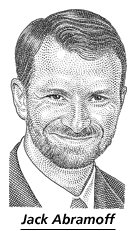
By Anne E. Kornblut
The New York Times
Thursday 22 December 2005
Abramoff may testify against "at least a dozen lawmakers and their former staff members."
Washington - Jack Abramoff, the Republican lobbyist under indictment for fraud in South Florida, is expected to complete a plea agreement in the Miami criminal case, setting the stage for him to become a crucial witness in a broad federal corruption investigation, people with direct knowledge of the case said.
One participant in the case said the deal could be made final as early as next week.
The terms of the plea deal have not been completed, and the negotiations are especially complicated because they involve prosecutors both in Miami and in Washington, where Mr. Abramoff is being investigated in a separate influence-peddling inquiry, participants said. Details of what he feels comfortable pleading guilty to are "probably largely worked out," the participant said, while the details of the prison sentence are less resolved.
Some of the details are still "in flux," said a participant who, like others interviewed, was granted anonymity because of the sensitivity of the talks.
"Anything can happen," the participant said, adding that the agreement could fall apart. Another person with detailed knowledge of the case said that while negotiations were continuing, the deal could take longer than another week to be settled.
But after a lengthy bargaining phase, Mr. Abramoff's lawyers and prosecutors in the Florida case appear closer to resolving several of the central issues in the plea deal, in which the defendant would receive a reduced prison sentence - most likely in the range of five to seven years, though that is fluid - in exchange for pleading guilty and agreeing to testify against his former associates.
Mr. Abramoff was indicted in Florida on Aug. 11 on charges stemming from his purchase of a fleet of casino boats in 2000. Prosecutors said Mr. Abramoff and a business partner, Adam Kidan, falsified documents and lied about their financing in order to complete the purchase. Mr. Kidan pleaded guilty last week, leaving Mr. Abramoff to face six criminal counts and up to 30 years in prison as case's sole defendant.
At the same time, prosecutors in Washington have been sifting through evidence of what they believe is a corruption scheme involving at least a dozen lawmakers and their former staff members, many of whom worked closely on legislation with Mr. Abramoff and accepted gifts and favors from him. Although Mr. Abramoff is also in negotiations in that case, it is unclear whether a settlement can be reached in time for both agreements to be announced at once.
Michael Scanlon, a close business associate of Mr. Abramoff in Washington who also worked on the SunCruz casino boat deal, pleaded guilty in October in exchange for testifying in both inquiries. The case, being worked on by dozens of investigators as part of a multi-agency task force, has expanded in recent months to put senior Republican officials and prominent party lobbyists under immense scrutiny.
Go to Original
Will someone please FIRE this man...
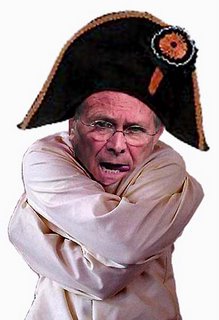
A Conditions-Based Withdrawal?
Link here
Today, Secretary of Defense Donald Rumsfeld announced the administration would withdraw two combat brigades from Iraq – approximately 7,000 troops. Rumsfeld disingenuously claimed that the pullout was a result of improving conditions on the ground. “Conditions here in Iraq have evolved favorably,” Rumsfeld said. Since the largely peaceful elections on December 15th (peaceful because insurgents observed a truce that allowed Iraqis to go to the polls), the violence on the ground has escalated to pre-election levels:
“A soldier was killed by a bomb Thursday while on patrol in Baghdad, the military said. Violence around the country, including a suicide car bombing, left more than a dozen people dead, including six police officers, authorities said.” [LAT, 12/23/05]
“Guerrillas stormed an Iraqi army post on Friday [near Adhaim, north of Baghdad], killing 10 soldiers and wounding 20…in the bloodiest attack since last week’s parliamentary election.” [Reuters, 12/23/05]
“Violence has once again risen following a period of quiet around the election, for which a huge security clampdown was imposed.” [AFP, 12/20/05]
“[Vice President Cheney’s visit to Iraq] came as insurgents broke the relative calm since the national election on Thursday with a string of attacks in central and northern Iraq that left at least nine people dead.” [NYT, 12/19/05]
“Gunmen killed two relatives of a senior Kurdish official and 17 others died in a string of attacks overnight and on Sunday, piercing three days of relative calm that followed the country’s first election for a full-term parliament.” [AP, 12/18/05]
While Rumsfeld’s announcement of a pullout appears to be in line with the goals of Rep. John Murtha and other critics of the Bush strategy, there is one key difference. The Bush Administration wants the American public to believe that the pullout is a validation of a successful strategy. In contrast, Murtha has said a pullout is necessary because “our current policy is creating as many or more terrorists than it is eliminating. It is simply not working.”
In order to fix the Bush administration’s failed strategy in Iraq, it’s important that the administration speak honestly about why it is beginning to pullout.
Italy warrants for 22 'CIA agents'
European arrest warrants are issued in Italy for 22 purported CIA agents accused of kidnapping an Egyptian-born Muslim cleric -- Osama Nasr Mostafa Hassan, also known as Abu Omar -- in Milan in 2003. Prosecutor Armando Spataro (pictured) said the warrants were issued December 20.
FULL STORY
FULL STORY
-- An Azerbaijan Airlines passenger plane with up to 60 people aboard has gone missing, The Associated Press reports.
That is an EXCELLENT question.
 December 22, 2005
December 22, 2005Where Are
the Arrests?
Link Here
Perhaps I'm a little slow, but there's something else that doesn't make sense about spygate. Since October 2001, Bush has authorized 30 times - every 45 days - warrantless NSA domestic surveillance of what I have heard estimated of approximately 1,000 US persons a year. That would be 4,000 persons over the past four years, if I understand the shifting numbers offered correctly. But whatever it is. The Administration insisted again today that the only US persons being authorized to be spied on by Bush -- that he somehow didn't think he could get FISA warrants on -- are directly linked to Al Qaeda suspects or a related terrorist group. As Assistant Attorney General William E. Moschella wrote in a public letter (.pdf linked) to Senate and House Intelligence committee leaders today, "As described by the President, the NSA intercepts certain international communications into and out of the United States of people linked to al Qaeda or an affiliated terrorist organization."
This begs the question: how many people known to be "linked" to Al Qaeda has the administration let roam the streets of America since 9/11? I would guess the answer would be approaching zero.
I simply find it hard to believe that we would have not heard of approximately 4,000 arrests were what Moschella is saying true. Being a close associate on the phone with a known Al Qaeda terrorist abroad must surely be grounds for more than a FISA warrant, which Bush never bothered to try to get. If many Americans had reason to think their neighbor was "linked to al Qaeda," they surely would be on the phone to the FBI right away. Given that PETA and vegan groups are being investigated by the FBI, surely those in the US who regularly converse on the phone with real al Qaeda terrorists abroad -- who are, as Asst. Attorney General Moschella writes, "linked to Al Qaeda" -- would be a rich target for investigation and arrest, it would seem. So, why haven't we heard of more than a scattering of arrests around the country of al Qaeda cells? Some of those which have fallen apart (the Detroit case, for one)? Surely if there were 4,000 US persons in the past four years "linked with al Qaeda," who communicated directly with known al Qaeda terrorists, we should have vast sweeping arrests around the country and our papers would be full of these stories, the trials, the deportations, the threats averted...
But the administration has only cited one arrest from the program, the guy who planned to blow up the Brooklyn Bridge.
So what is going on?
Or, should we doubt that the US persons being monitored have such a direct "link" to Al Qaeda or the other terrorist group? Should we doubt that there was even enough probable cause linking them to terror groups or terror suspects or even terrorist phone numbers abroad that they would even be a probable candidate for a FISA warrant?
And remember. These are cases the Bush administration insists required such time urgency, he couldn't risk going to the FISA court even three days after the wiretap had been ordered. So the administration is making a case for urgency here, not like these are casual conversations. So why haven't there been more arrests? Why not more cases?
Something is extremely fishy here. One could be inclined to predict that when all is said and done, it will be revealed that the thousands of US persons being monitored without warrants have a far, far more distant relationship -- indeed likely a non-existent relationship -- to any terror suspect or group than the Bush administration has repeatedly insisted it limited itself to. Perhaps nothing more than they have called Pakistan in a certain time period. Perhaps nothing more than they called Yemen. Otherwise, the administration would have more arrests and terrorism prosecutions to show for it.
I think we're in store for some pretty tortured definitions of "linked to" in the near future, coupled with allegations that the administration continues to lie to Congress and the public about the safeguards it put on this program to prevent vast interception of calls of those suspected of no wrongdoing at all, and what it did with that information. One can almost hear the shredder.
Posted by Laura at December 22, 2005 09:51 PM
Ahmed Chalabi "Appears To Have Suffered A Humiliating Defeat At The Recent Iraq Polls"...
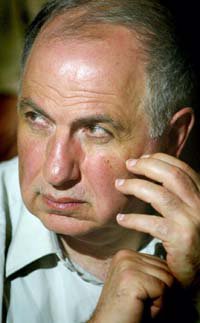
Editor & Publisher December 23, 2005 at 09:27 AM
READ MORE: Iraq, NBC
The politician and onetime administration and U.S. newspaper source, Ahmed Chalabi, "appears to have suffered a humiliating defeat at the recent Iraq polls," NBC News reports today, according to the uncertified preliminary results.
It said that preliminary results in the Iraqi capital of Baghdad indicate that Chalabi’s Iraqi National Congress scored a minuscule 0.36 percent of the votes.
READ WHOLE STORY
See Rossi!!! I TOLD you that was the spooks on the line with us!!!
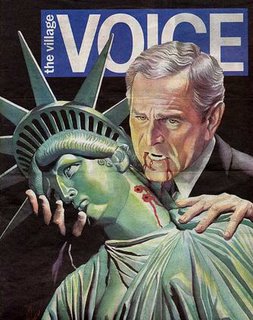
Spy net may pull in all
U.S. calls overseas
Many Americans' privacy is at risk, some say
Friday, December 23, 2005
By CHARLIE SAVAGE
THE BOSTON GLOBE
WASHINGTON -- The National Security Agency, in carrying out President Bush's order to intercept the international phone calls and e-mails of Americans suspected of links to al-Qaida, has probably been using computers to monitor all other Americans' international communications as well, according to specialists familiar with the workings of the NSA.
The Bush administration formally defended its domestic spying program in a letter to Congress late Thursday, saying the nation's security outweighs privacy concerns of individuals who are monitored.
In a letter to the chairmen of the House and Senate intelligence committees, the Justice Department said President Bush authorized electronic surveillance without first obtaining a warrant in an effort to thwart terrorist acts against the United States.
"There is undeniably an important and legitimate privacy interest at stake with respect to the activities described by the president," wrote Assistant Attorney General William Moschella. "That must be balanced, however, against the government's compelling interest in the security of the nation."
The Bush administration and the NSA have declined to provide details about the program the president authorized in 2001, but specialists said the agency serves as a vast data collection and sorting operation. It captures reams of data from satellites, fiber-optic lines and Internet switching stations and then uses a computer to check for names, numbers and words that have been identified as suspicious.
"The whole idea of the NSA is intercepting huge streams of communications, taking in 2 million pieces of communications an hour," said James Bamford, the author of two books on the NSA, who was the first to reveal the inner workings of the secret agency.
"They have a capacity to listen to every overseas phone call," said Tom Blanton, director of the National Security Archive at George Washington University, which has obtained documents about the NSA's using Freedom of Information Act requests.
The NSA's system of monitoring e-mails and phone calls to check for search terms has been used for decades overseas, where the Constitution's prohibition on unreasonable searches does not apply, declassified records have shown.
But since Bush's order in 2001, Bamford and other specialists said, the same process probably has been used to sort through international messages to and from the United States, though humans have never seen the vast majority of the data.
"The collection of this data by automated means creates new privacy risks," said Marc Rotenberg, executive director of the Electronic Privacy Information Center, a watchdog group that has studied computer-filtered surveillance technology through Freedom of Information Act lawsuits.
Among the risks, he said, is that the spy agency's computers will collect personal information that has no bearing on national security and that intelligence agents programming those computers will be tempted to abuse their power to eavesdrop for personal or political gain.
But even when no personal information intercepted by the NSA's computers make it to human eyes and ears, Rotenberg said, the mere fact that spy computers are monitoring the calls and e-mails may also violate the Fourth Amendment, which protects against unreasonable search and seizures.
The Supreme Court has never ruled on whether automated surveillance of phone calls and e-mails, without a warrant, is constitutional.
The closest comparisons, legal specialists said, are cases challenging the use of dogs and infrared detectors to look for drugs without a warrant. The Supreme Court approved the use of drug-sniffing dogs to examine luggage in an airport, but said police could not use infrared scanners to check houses for heat patterns that could signal an illegal drug operation.
"This is very much a developing field, and a lot of the law is not clear," said Harvard Law School professor Bill Stuntz.
Bush and his aides have declined to answer questions about the spying program, other than to insist that it was legal. Attorney General Alberto Gonzales this week said the program only targeted messages "where we have a reasonable basis to conclude" that one of the parties is affiliated with al-Qaida.
And some legal scholars have maintained that a computer cannot violate other Americans' Fourth Amendment rights simply by sorting through their messages, as long as no human being ever looks at them.
Alane Kochems, a lawyer and a national security analyst at the conservative Heritage Foundation, said, "I don't think your privacy is violated when you have a computer doing it as opposed to a human. It isn't a sentient being. It's a machine running a program."
But Yale Law School professor Jack Balkin said Fourth Amendment privacy rights can still be violated without human contact if the NSA stores copies of everyone's messages, raising the possibility that a human could get access to them later. The administration has not revealed how long the NSA stores messages.
Balkin added that as technology becomes ever more sophisticated, any legal distinction between human agents and their tools is losing meaning.
Under the theory that only human beings can invade people's privacy, he said, the police "could simply use robots to do their dirty work."
In 1978, after revelations that President Nixon had used the NSA to spy on his domestic enemies, Congress enacted a law making it illegal to wiretap a U.S. citizen without permission from a secret national security court. The court requires the government to show evidence that the target is a suspected spy or terrorist.
Under the 1978 law, NSA authorities have had to obtain a warrant from the secret court before putting an American's information into their computers' search terms.
--Dear Homeland Insecurity,,,
If you can read these words ... EAT A DICK.--





